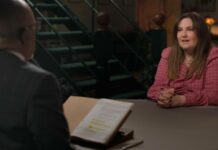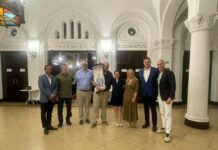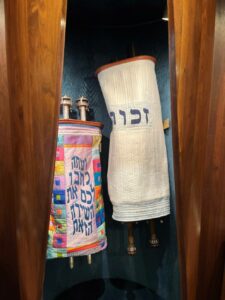
The two Torahs inside Temple Sholom in Broomall’s ark have different designs on their covers. One is colorful. The other is blue and white.
But other than that, they are not that much different. They have thick covers with Hebrew letters on the outside. They have shafts that hold the parchment together sticking out of the top and bottom.
And inside, there are scrolls. Rough parchment. Hebrew letters and sentences written in black ink from right to left.
But one of these is a little unlike the other. The one with the blue and white cover is from Czechoslovakia before the arrival of Nazi Germany and the Holocaust. It’s here in Broomall in 2023, across the Atlantic Ocean and more than eight decades, because of the Memorial Scrolls Trust.
The independent charity has helped preserve 1,564 Torah scrolls from a Czech Jewish community that barely still exists (around 5,000 members according to most estimates). The books are in the Memorial Scrolls Trust Museum in London. But the charity also distributes them to synagogues, schools and other Jewish organizations.
One hundred and thirty-two are at shuls in the Philadelphia area, according to Barbara Chesler, the charity’s representative for Pennsylvania. And on Nov. 9, the anniversary of Kristallnacht, their keepers will bring them to Congregation Rodeph Shalom in Philadelphia. A night of music, prayers and a Torah procession will ensue. The event will also mark the MST’s 60th anniversary.
“The Torah is what binds Jews around the world as one people,” said Chesler, who belongs to Temple Sholom in Broomall. “They are the word that we live by.”
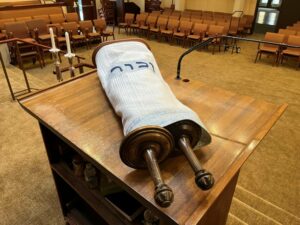
(Photo by Jarrad Saffren)
The Jews of Czechoslovakia, now the Czech Republic and Slovakia, “were able to save their Torah scrolls during the Holocaust,” Chesler wrote in an email. “Shuls and some families sent their Judaica to the Jewish Museum of Prague in 1942,” she said. More than 212,000 artifacts ended up in the museum. And while the Nazi regime “destroyed the Jewish people and their culture,” it did not destroy the artifacts.
“Each item was labeled and entered on an index card by the museum’s staff,” Chesler wrote. Chief Curator Josef Polak added a description of the item and its town of origin.
In the early 1960s, a philanthropist named Ralph Yablon “purchased the scrolls and donated them to Westminster Synagogue,” according to memorialscrollstrust.org. (Yablon was a founding member of the London-based synagogue.) Then, Yablon helped create the Memorial Scrolls Trust “to take over the formal responsibility for the scrolls.”
Early representatives from the MST traveled to Czechoslovakia to talk to residents and survivors and verify the Torahs, according to Chesler. The oldest one that got to London dates to the 1200s. The youngest was from the 1930s.
“Damaged and deteriorating, the scrolls needed loving care,” Chesler wrote.
Rabbi Peter Rigler, who leads Temple Sholom in Broomall, “wanted to make sure we had a Holocaust scroll,” he said. Two years ago, his Reform community received one.
“As we move further from the Holocaust itself, kids don’t know. Historical memory is fading,” the rabbi said. “We’ve had speakers and others come in. We take kids every year to the (United States) Holocaust (Memorial) Museum (in Washington, D.C.). But it’s not enough.”
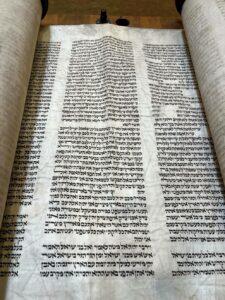
Rigler will bring the Torah from Czechoslovakia out for High Holiday services and religious school lessons. He does not miss an opportunity to explain its history.
Temple Sholom hosts 40 bar and bat mitzvahs per year. In the two years since it got the Torah, 10 young Jewish men and women have asked to use it on their special days. Some had a Holocaust connection in their families. Others just learned about it and wanted to use it.
“They are connecting with it. It’s another way of bringing it to life for our students,” Rigler said.
On Kol Nidre this year, the rabbi took out the scroll and mentioned that “we’re thinking of the people who are no longer with us.” He is not sure of the exact community that used it before the Holocaust. The MST was only able to inform the synagogue of its region. But the rabbi imagines that it was a community not unlike a Reform synagogue in the Philadelphia area in the 2020s.
“When we talk about the Holocaust memorial scroll, we talk about the idea that there was a vibrant community that prayed with the Torah, danced with the Torah, probably cried in front of the ark,” he said.




